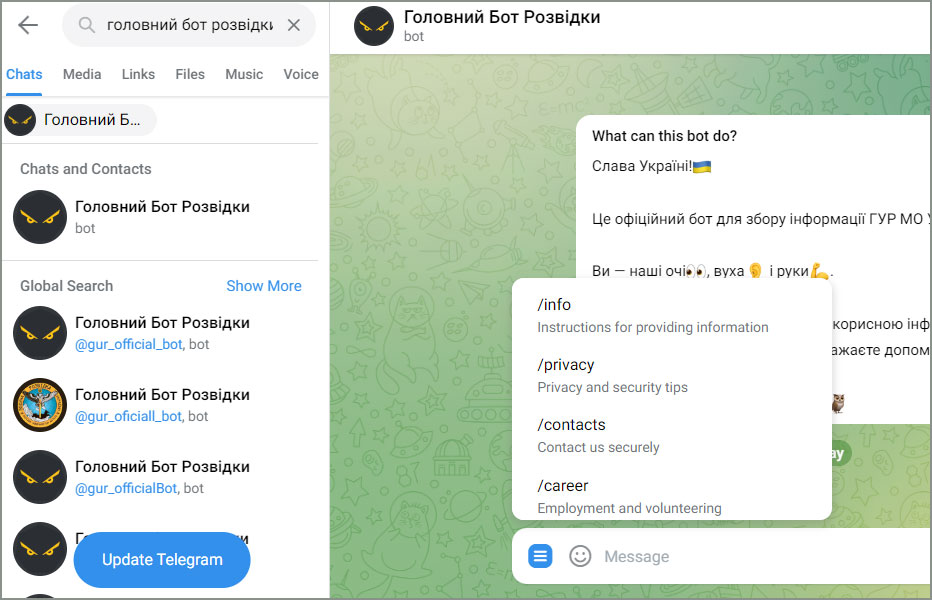Telegram blocks then unblocks chatbots used by Ukraine’s security services to get info on Russian activities
Telegram messaging app initially blocked then unblocked chatbots utilized by Ukraine's security agencies to gather intelligence on Russian aggression. Similar Russian channels were reportedly never blocked.


On 29 April, Ukraine announced that the Russian-origin Telegram messaging app had reinstated access to several chatbots utilized by its security agencies to gather information on Russian aggression. This action followed a brief suspension the previous night.
In 2019 and then in 2022, the current Ukrainian authorities widely promoted Telegram messenger, founded by Russian nationals. While using it themselves, Ukrainian special services say it’s a threat to national security.
Ukraine’s Center for Strategic Communication and Information Security reported that Ukrainian chatbots crucial for combating Russian aggression, including those operated by the Security Service of Ukraine (SBU), Main Directorate of Intelligence (HUR), and the Ministry of Digital Transformation, have been reinstated after a temporary blockage.
The statement further specifies that the affected bots belong to HUR, the SBU, and the YeVoroh bot, which is utilized for tracking Russian troops and equipment. Ukrainian TV’s TSN news show said that a PPO bot for informing on the encounters with Russian missiles and drones was also blocked.
Bot ban
On 24 April, Telegram founder Pavel Durov wrote the following:
“We still ban accounts and bots that collect coordinates to target strikes or post direct personal information with calls to violence. We don’t want Telegram to be a tool for violence — so please report such channels/bots to us if you see them.”
Around midnight overnight on 28-29 April, HUR reported that Telegram blocked several official Ukrainian messaging bots, including one operated by HUR. According to HUR on Telegram, the platform’s management unilaterally blocked multiple official messaging bots, including the Main HUR Bot “despite Telegram’s own rules and public assurances.”
Ordinary citizens have been using these bots to report Russian troop movements or anything else of interest to the special services.
HUR emphasized the safety of personal data, even in light of the bot blockade. Additionally, they cautioned users against similar-looking bots created by Russians and advised against sharing personal information with them.
One of the popular Ukrainian airspace monitoring Telegram channels, Nikolaevsky Vanyok, noted that his team revealed “over 15” similar Russian channels, but those were not blocked alongside their Ukrainian counterparts.
Earlier this morning, before Telegram unblocked the bots, the Parliament’s Head of the Parliament’s Freedom of Speech Committee. MP Yaroslav Yurchyshyn, stated on his Facebook page that Russia’s FSB security service was behind the blocking. In response to a question from Liga about whether Ukraine had tried to contact Telegram owner Pavel Durov directly, Yurchyshyn said,
“Mr. Durov ignores all requests from Ukraine.”
Russian Telegram in Ukraine
Telegram, founded in 2013 by Russian nationals, Nikolai and Pavel Durov, originated from their previous venture, VK, a Russian social network. Pavel sold his remaining stake in VK in 2014 and left Russia claiming government pressure. Despite ongoing allegations of Telegram’s cooperation with Russia’s FSB security agency, Durov denies any involvement.
In Ukraine, the Telegram messenger gained significant popularity after being widely used by Volodymyr Zelenskyy’s team during the 2019 presidential elections. It further surged in usage following Russia’s full-scale invasion in 2022, as authorities of all levels used Telegram to inform the public amidst DDoS attacks on official sites, often making it de facto the main source of official information.
In March 2024, Oleksandr Melnychenko, a representative of the ІSBU’s Department for Counterintelligence Protection of State Interests in Information Security, stated that Telegram collaborated with the Russian FSB and Roskomnadzor, complying with Russian requests to block specific channels. Later in early April, HUR chief Kyrylo Budanov said that Telegram posed a national security issue.
At the same time, Ukrainian special services created a number of monitoring bots in Telegram for citizens to report the spotted Russian equipment and military or inform on the missiles or drones flying by.
Update:
Read also:
- Russian FSB has the keys to Telegram and Viber messengers and uses them for espionage — Ukrainian intelligence (2023)
- Pro-Russian, ruling party Ukrainian politicians promote Telegram channels of Russia’s special services
- Telegram: the Russian messaging app at the heart of a major influence operation in Ukraine (2020)
You could close this page. Or you could join our community and help us produce more materials like this.
We keep our reporting open and accessible to everyone because we believe in the power of free information. This is why our small, cost-effective team depends on the support of readers like you to bring deliver timely news, quality analysis, and on-the-ground reports about Russia's war against Ukraine and Ukraine's struggle to build a democratic society.
A little bit goes a long way: for as little as the cost of one cup of coffee a month, you can help build bridges between Ukraine and the rest of the world, plus become a co-creator and vote for topics we should cover next. Become a patron or see other ways to support.



